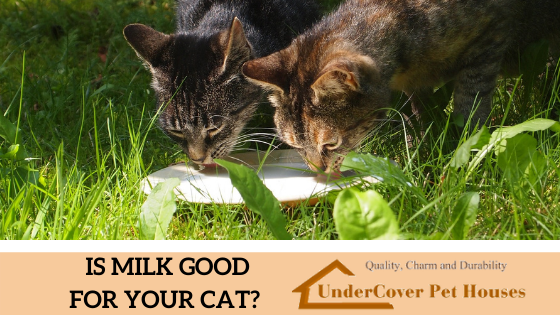 Loading... Please wait...
Loading... Please wait...Blog - is milk good for cats
Is Milk Good for Cats?
Posted by Danny MacDonald on 2021 Nov 1st

Like many other
issues in cat ownership, there are no hard and fast rules to dictate what cats
should feed on. Every cat owner is familiar with the old wives' tale that cow
milk is good for cats—or a cat lapping up a bowl of milk.
However, these statements could be further from the truth, given there's a lot of misinformation on whether milk is suitable for cats or not. After all, many cat parents have different opinions around this issue.
Here's what you need to know about cats and milk.
Cats are Carnivores
Cats are obligate carnivores (meaning they only digest meat). The domestic cat is a predator that relies on meat protein from its diet for optimal health. This makes milk an inappropriate source of nutrition for cats; milk contains large amounts of sugar (lactose) and has virtually no meat protein at all.
As it turns out, lactose—the sugar in milk—can cause intestinal distress issues like diarrhea in both kittens and adult cats. In addition, research published by Cornell University reveals that common breeds of domesticated cats have developed a genetic mutation resulting in an inability to properly digest lactose after only two or three weeks of age.
In other words, even though kitties may enjoy drinking mommy's milk when they are a few weeks old, most adults cannot tolerate milk well.
Cats' Lactose Intolerance
Lactose refers to sugar that's found in milk or produced by mammals. Cats don't produce enough of an enzyme called lactase, which is necessary for breaking down lactose into simpler sugars.
As a result, when a cat consumes significant amounts of dairy products, it has trouble digesting them—sometimes making their stomach upset, leading to vomiting and diarrhea.
Because cats are obligate carnivores, they don't have much use for dairy products in their diet. So if your cat is affected by lactose intolerance, there may be other underlying causes for its overeating or weight gain. Your vet can offer insight on what those reasons might be.
Can Kittens Have Cow Milk?
Avoid giving your kitten cow's milk. While young kittens can tolerate lactose, cow milk isn't nutritious to kittens. It lacks the essential growth compounds needed by kittens, such as protein, fats, and immunity antibodies.
It's recommended to let kittens wean themselves off their mother's milk. If not, they should be fed on special milk formulated for kittens.
Are There Alternatives to Cow's Milk for Cats?
If your feline friend is lactose intolerant but occasionally enjoys milk, there are several alternatives you can try.
Plain yogurt contains less lactose and is easier for cats to digest than other dairy products because it contains 'good bacteria. It's also great for your cat's digestive health. However, it should be fed in small amounts.
Lactose-free milk is also another option, while soy milk is out of the picture. Soy milk often contains added sugar which isn't ideal for your cat. Another option is the feline milk substitutes which are formulated to be easily digested by cats.
Bottom Line
There are some good reasons why cats don't drink milk in the wild and why it's not necessarily healthy for them to do so in your care. In most cases, cow milk it's not good for cats.
While other dairy products like plain yogurt, cheese, or ice cream work well for some cats, don't feed them regularly. You also need to know if your cat is lactose intolerant or suffers from milk allergy beforehand.
More importantly, remember that milk shouldn't be considered a substitute for proper nutrition but only a treat. For more information on milk and dairy products suitable for your cat, consult with your veterinarian.
